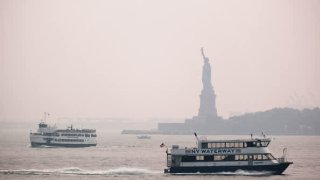
- Wildfire smoke from Canada and the U.S. West spread across the country this week, creating haze-filled skies and unhealthy air quality as far away as New York and Pennsylvania.
- In recent days, more than 80 wildfires have burned nearly 1.3 million acres in the West, which is experiencing a historic climate change-fueled drought.
- The smoke was carried by the jet stream and cross-continental wind, triggering health alerts thousands of miles away.
SANTA MONICA, Calif. — Wildfire smoke from Canada and the U.S. West spread across the continent this week, creating haze-filled skies and unhealthy air quality as far away as New York, New Jersey and Pennsylvania.
In recent days, more than 80 wildfires have burned nearly 1.3 million acres in the West, which is experiencing a historic climate change-fueled drought that has triggered dangerously arid conditions, according to data from the National Interagency Fire Center.
In southern Oregon, the Bootleg Fire, the season's largest blaze, has burned nearly 400,000 acres and has become so intense that it's generating enough heat and energy to change the weather.
Get Boston local news, weather forecasts, lifestyle and entertainment stories to your inbox. Sign up for NBC Boston’s newsletters.
The government of British Columbia declared a state of emergency after blazes caused dozens of evacuation orders. The region is experiencing 295 active wildfires, with 15 igniting in the past two days, according to government data.
The smoke and ash from the wildfires was carried by the jet stream and cross-continental winds, triggering health alerts thousands of miles away, including the Upper Midwest and the Northeast, the National Weather Service said.
Money Report
Northerly winds transported wildfire smoke from north of the Canadian border to Minnesota, prompting officials in the state to issue an air-quality alert.
In New York, a thick haze covered Manhattan's skyline, and the air quality index for fine particulate matter reached an unhealthy range well above the threshold of 100 after winds blew smoke from states like California, Oregon and Montana.
Other cities including Philadelphia and Boston also experienced AQI readings above 150, a level that is considered unhealthy for all people and significantly above exposure recommendations from the World Health Organization. Those cities, along with Washington and Baltimore, are under air quality alerts.
More than three-fourths of the West is in severe drought, according to the U.S. Drought Monitor, and climate change has created hotter and drier conditions that spur more intense and frequent wildfires.
While it's not unprecedented for Western wildfire smoke to travel long distances, it typically doesn't do so until later in the summer and fall. The smoke also usually remains at high levels in the atmosphere and doesn't affect air quality at lower levels.
Health officials have suggested that people in areas with especially poor air quality should wear filtered masks and avoid strenuous exercise outdoors.






